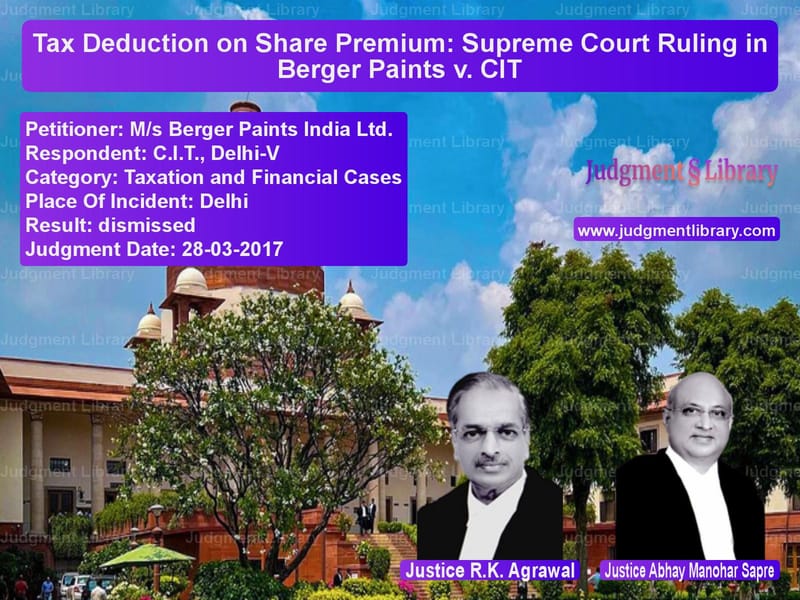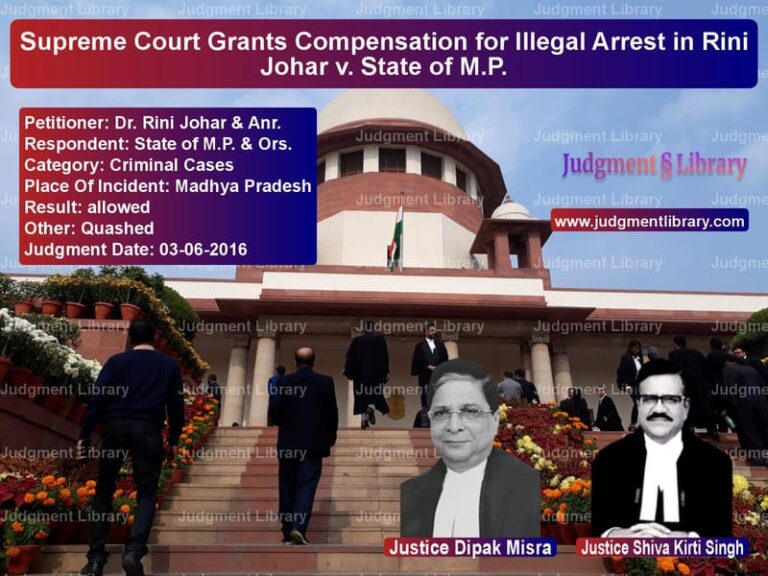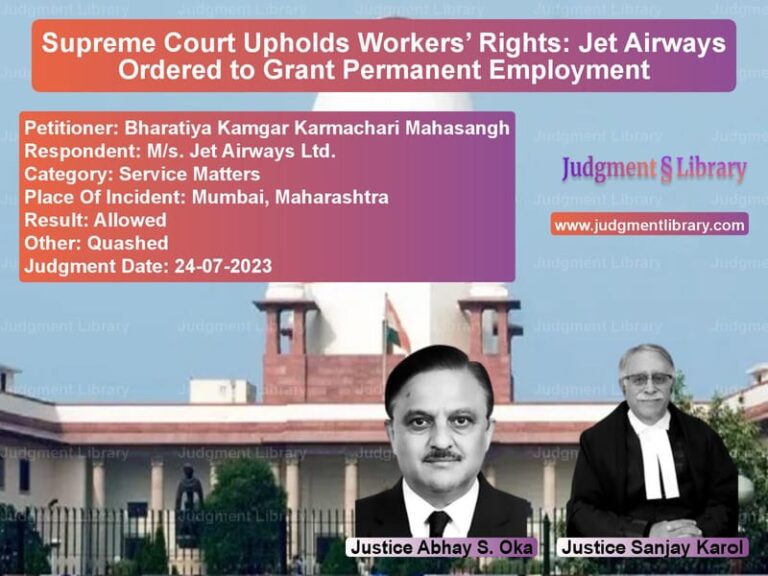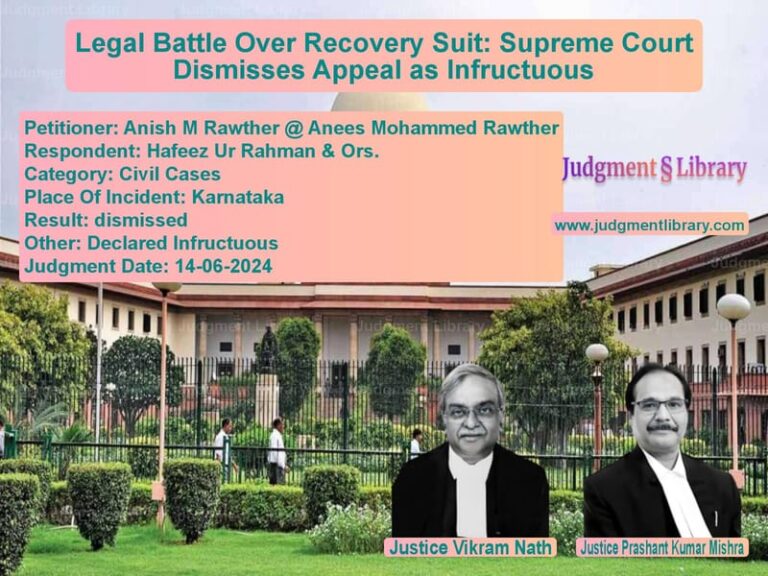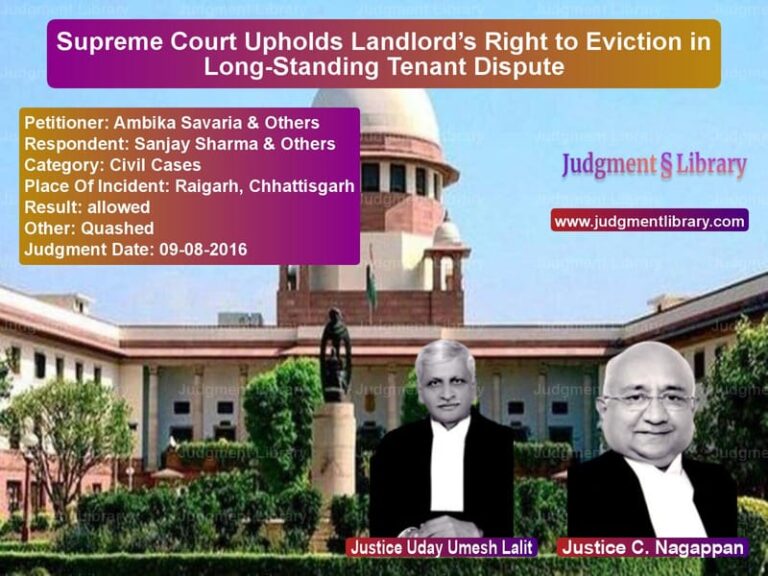Tax Deduction on Share Premium: Supreme Court Ruling in Berger Paints v. CIT
The Supreme Court of India delivered a landmark judgment in the case of M/s Berger Paints India Ltd. v. Commissioner of Income Tax, Delhi-V, addressing the critical issue of whether share premium collected by a company constitutes ‘capital employed in the business’ for tax deduction under Section 35D of the Income Tax Act. The Court ruled against Berger Paints India Ltd., affirming that share premium does not qualify as capital employed for the purpose of claiming deductions.
Background of the Case
The case arose when Berger Paints India Ltd., a leading paint manufacturing company, claimed a deduction under Section 35D of the Income Tax Act for preliminary expenses based on the inclusion of share premium in the capital employed in the business. The company initially filed its income tax returns for the assessment years 1996-97 and 1997-98, which were processed by the Assessing Officer (A.O.). The company claimed a deduction of Rs. 7,03,306 under Section 35D, which the A.O. partly disallowed, stating that share premium was not part of the capital employed.
Decisions by Lower Authorities
Berger Paints appealed against the A.O.’s decision, and the Commissioner of Income Tax (Appeals) ruled in favor of the company, allowing the full deduction. However, the Revenue Department challenged this decision before the Income Tax Appellate Tribunal (ITAT), which ruled in favor of the Revenue, reversing the decision of the Commissioner (Appeals). The company then took the matter to the Delhi High Court, which upheld the ITAT’s decision. Dissatisfied with the High Court ruling, Berger Paints appealed to the Supreme Court.
Legal Question Before the Supreme Court
The primary issue before the Supreme Court was whether the ‘share premium’ collected by a company while issuing shares should be considered part of the ‘capital employed in the business’ under Section 35D of the Income Tax Act, which would make it eligible for deduction.
Arguments of the Petitioner (Berger Paints India Ltd.)
The petitioner argued that:
- The term ‘capital employed in the business’ should include share premium as it represents an inflow of capital into the company.
- Since share premium is reflected in the balance sheet and forms part of shareholders’ funds, it should be treated as capital employed.
- Under the Companies Act, share premium is categorized as a reserve and forms part of the company’s net worth.
Arguments of the Respondent (CIT, Delhi-V)
The Commissioner of Income Tax contended that:
- The Income Tax Act clearly defines ‘capital employed in the business’ to include only share capital, debentures, and long-term borrowings, and does not mention share premium.
- Share premium is recorded separately in financial statements and is not included as part of issued, subscribed, and paid-up share capital.
- Allowing deductions on share premium would lead to revenue loss and misinterpretation of the statute.
Supreme Court’s Judgment
The Supreme Court, in its ruling, upheld the decision of the High Court and ITAT, stating that share premium does not constitute capital employed in the business for the purposes of Section 35D. The Court relied on the following key points:
- The explicit wording of Section 35D includes only three components in ‘capital employed’—share capital, debentures, and long-term borrowings.
- Share premium is recorded in a separate ‘Securities Premium Account’ as per the Companies Act and does not contribute directly to capital employed in the company’s business.
- Had the legislature intended to include share premium, it would have explicitly mentioned it in the law.
- Reliance was placed on the earlier ruling in Commissioner of Income Tax, West Bengal v. Allahabad Bank Ltd., where the Supreme Court held that share premium was not part of paid-up capital unless explicitly stated in the law.
- The judgment emphasized that taxation statutes must be interpreted strictly as per legislative intent, and courts cannot expand the meaning of provisions beyond what is explicitly stated.
Impact of the Judgment
The Supreme Court’s ruling has significant implications for corporate tax planning and financial accounting in India:
- Strict Interpretation of Tax Laws: The judgment reinforces the principle that tax deductions must be strictly interpreted in line with statutory provisions.
- Financial Planning for Companies: Companies can no longer claim deductions under Section 35D based on share premium, which may impact financial structuring decisions.
- Clarity on Share Premium Treatment: The decision reaffirms that share premium is separate from share capital and is not to be treated as a part of capital employed in business.
- Guidance for Future Tax Disputes: This judgment serves as a precedent for similar disputes regarding the classification of financial elements under tax laws.
Conclusion
The Supreme Court’s judgment in Berger Paints India Ltd. v. CIT provides clarity on the scope of capital employed under Section 35D of the Income Tax Act. The decision reinforces the need for strict statutory interpretation and prevents companies from inflating deductions using share premium. This ruling is a significant precedent in corporate taxation, ensuring uniform application of tax laws across businesses in India.
Don’t miss out on the full details! Download the complete judgment in PDF format below and gain valuable insights instantly!
Download Judgment: Ms Berger Paints In vs C.I.T., Delhi-V Supreme Court of India Judgment Dated 28-03-2017.pdf
Direct Downlaod Judgment: Direct downlaod this Judgment
See all petitions in Income Tax Disputes
See all petitions in Tax Evasion Cases
See all petitions in Tax Refund Disputes
See all petitions in Judgment by R K Agrawal
See all petitions in Judgment by Abhay Manohar Sapre
See all petitions in dismissed
See all petitions in supreme court of India judgments March 2017
See all petitions in 2017 judgments
See all posts in Taxation and Financial Cases Category
See all allowed petitions in Taxation and Financial Cases Category
See all Dismissed petitions in Taxation and Financial Cases Category
See all partially allowed petitions in Taxation and Financial Cases Category

